#flood myth
Text
In a journey across cultures the mysteries of world mythologies and legends showcase shared wonders that make us ponder the fascinating similarities.
Whether it's the biblical 'Let there be light,' the primordial Pangu crafting the universe, or the surreal Dreamtime of Australian Aboriginal mythology, they all include common themes that transcend time and space, challenging the laws of physics and reality.
What was behind the creation of the first man and woman in myths like Adam and Eve, Fu Xi and Nu Wa, and Manu and Shatarupa? The unique link these first couples had with deities, capable of communicating in a world where the laws of science were more fluid, allowed for surreal occurrences like talking snakes and apples of knowledge.
The flood myths that transcend cultures, from Noah's Ark to Manu's tale in Hindu mythology. Tell of great resets and reboots that act as a cleansing force after human failures.
The fascinating world where cultures, despite limited contact, unveil astonishing similarities, spark wonder at the universal allure of angels, goblins, and ethereal beings.
#myth#Creation myth#Vedic#Hinduism#Flood myth#Epic of Gilgamesh#Genesis#ancient#history#ancient origins
33 notes
·
View notes
Text

A small frog who acted upon a large and greedy desire. Tiddalik's guzzling of all water was an issue to everyone, and thus everyone had to come together to deal with the result of his unchecked drink.
#BriefBestiary#bestiary#digital art#fantasy#folklore#legend#myth#mythology#dreamtime#dreaming#tiddalik#tiddalik the frog#australian legend#australian folklore#legendary frog#flood myth
16 notes
·
View notes
Text
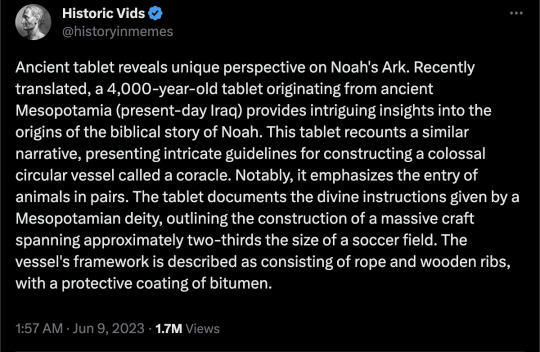
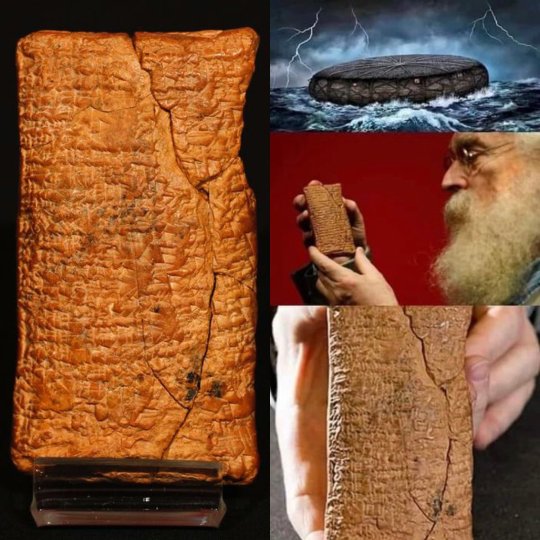
Will Xians finally stop pretending this fable actually happened?
#christianity#bible#bible study#noah's ark#stolen mythology#myths and legends#noahic flood#flood myth#worldwide flood#genesis flood#religion#mesopotamia#religion is a mental illness
63 notes
·
View notes
Text
“In the Chinese myth of the great flood, the Moon Goddess sent her representative to earth, after the waters had subsided, to repeople the world. In the Babylonian account, Ishtar, the Moon Goddess, is reported to have both caused the great flood and to have saved a remnant of her people. Here her dual character is clearly seen, for she herself sent the flood and then lamented over the havoc she had wrought. On the Eleventh Tablet of Creation is told the story of the flood. It is called "The Lamentation of Ishtar at the Great Deluge." According to this ancient record the goddess Ishtar prophesied evil which immediately came to pass. If a person endowed with magic power prophesies, according to the "magic" way of thinking, she evokes that which she has prophesied, whether it be good or evil. We are still swayed by this old attitude when we feel it to be unlucky to suggest that something may go wrong, or that there may be an accident, or other misfortune, and we can still "feel" a hint of the dread which was caused by a witch's curse. For the curse was by no means only a wish that evil might be fall, it was believed actually to bring to pass the evil that had been "wished on" the cursed one. This colloquial expression gives the nearest modern equivalent to the old concept of a witch's prophecy or curse. So Ishtar, who was a noted prophetess, as were all the moon goddesses in whom the dark side of the moon was represented, prophesied evil, thus bringing the flood upon the earth. Then when mankind and all the animals were threatened by the rising waters, she pitied their plight and saved them.
Spake Ishtar like a child uttered the great goddess her speech, “All to corruption are turned and then I in the presence of the gods prophesied and
As I prophesied in the presence of the gods evil, to evil were devoted all my people and I prophesied
I the mother have begotten my people and like the young of the fishes they fill the sea
The gods concerning the spirits were weeping with me
The gods in seats seated in lamentation covered with their lips for the coming evil
Six days and nights passed
The wind, the deluge, storm overwhelmed.
On the seventh day in its course, was calmed the storm and all the deluge
Which had destroyed like an earth quake,
Quieted.”
As the poem proceeds, Ishtar is depicted in the boat which she has made and from which, like Noah from the Ark:
“On the seventh day in the course of it I sent forth a dove and it left”
. . .
"I sent the animals forth to the four winds"
There was probably an earlier version of this myth which makes the Moon God the central figure. Noah, in the Old Testament story, is probably a form of Nuah, a Babylonian moon goddess, and like Ishtar, he saved a remnant of the world from destruction in an ark which he built. Then when the waters subsided, Noah, taught by a dove, the bird which is invariably associated with moon deities, came out onto the land. The depopulated earth was repeopled from him and his family alone. He was thus the father of all who were born subsequently. As he had taken with him in the ark one pair of each animal species he was thus the generator or creator of all animal life on the renewed or redeemed earth.
The word ark is cognate with the Hindu word argha, which means crescent, and also with the arc of a circle. The ark in which Father Noah carried the animals over the flood was thus a moon boat. This story is put into the form of history, in the Old Testament, as is so much of religious myth. Even today, controversy still centers around the problem of the factual basis for the almost generally accepted legend of a great flood. Whatever may be the truth in regard to the deluge, it is clear that the story of the moon boat refers to psychological events. In the Chaldean story the whole happening is concretized. It is living men and animals who are transported over the floods to the "New World." In the Egyptian story Osiris, the Moon God, ferried the dead man who had been initiated into his rites, over the waters to the Isle of the Blest, and so gave him immortality. This also was a concretization. It was thought of as having an actual physical reality. But the Hindus, who were more psychologically minded than either the Chaldeans or the Egyptians, speak of the moon as carrying the souls of the dead over the waters to the sun where they live a redeemed life. This transition is represented in the Tantric diagrams of the Seven Stages of Consciousness. There the crescent moon is seen in the watery region, above which comes the fiery region of the sun. But already this is realized as symbol. The psychical is no longer projected into a concrete semihistorical happening, but the myth is recognized as representing stages of consciousness or of psychological development.
The moon boat of the Hindus carries the souls to the new world, the new incarnation, it is the boat of immortality. The Chinese moon goddess after the flood gives birth to all living things. It is a renewed world and a new creation. Men, women, and all animals arise from the different parts of her person. The moon goddess of Western Asia and of Europe similarly gave birth to all living creatures. The statues of Diana and those of the Asiatic moon goddesses in their hieratic form show animals and plants springing from heads, limbs, and breasts. For the Moon Goddess is the Many Breasted Mother of All, creator of all life on the earth.
The Moon Goddess is, in literal fact, the mother of all living things and yet, strange though it may seem, not only is she the life-giver but also the destroyer. She creates all life on the earth, and then comes the flood, which overwhelms it. And this flood is her doing, for she is cause of rain and storm and tide and also of the flood. But like Ishtar of Babylon, she laments at its consequences and does her best to save her children, who have all become ‘like the fishes of the sea.’ Similarly, though she stands passively by when her son is killed, the Moon Goddess mourns, as Aphrodite did, at the defeat and death of Adonis, an event that was commemorated annually, in the festival of the ‘weeping for Adonis.’”
-M. Esther Harding, Woman’s Mysteries: Ancient and Modern
51 notes
·
View notes
Text
Leviathan
The veil between life and death shattered. Davlin’s astral form had a mere fraction of a second to brace itself before it fell into the lightless depths of the everafter.
There was no splash to mark his arrival, just that same shock of cold he’d felt all those years ago. He tried to push the memory aside but fragments still drifted past: The shattering of the ice, his hair drifting lazily around him, the crack of a rib as his mother desperately tried to restart his heart.
His heart restarting.
He opened his eyes. His hair bobbed around him again, silver now, but as buoyant as it was in the memory. He’d never spoken with another necromancer long enough to learn whether death itself always had an aquatic theme, or merely his death. He could make out the glimmering forms of fresh souls in the shallows around him. Experience told him that those souls were useless as minions. Most were too fresh to realize they were dead, least of all forget who they were.
He’d have to dive deeper for that.
He pivoted in the space, bracing his legs against an intact part of the barrier and kicking off into the void beneath. His speed didn’t dissipate the way it would in water. If anything, it always seemed to gradually accelerate, like there was something at the bottom pulling every soul towards it. He didn’t want to consider what that thing could be.
He remained in his pose, weightless, the only reference for his speed being the occasional blur as he whipped past a fragment of soul. Any one of those pieces would’ve made a good enough catch for a simple husk of rotting meat and bone, but the vessel he’d prepared above required more than figments of thought and feeling.
It required a Leviathan.
He wasn’t sure how many people, ever, had known that such things existed. The fragmentary references to it that he’d found were literally antediluvian. Part of him wondered if the deluge had been called down to suppress the knowledge of them specifically, or if it was just one of the many sins that needed to be buried under mountains of water.
He saw it. Not the thing directly, that was still miles beneath the surface, but the whirling accretion disc of souls it was in the process of devouring. He forced mana into his palms, expelling it in shaped spikes of heatless force, and was surprised to find how much effort it took to begin slowing his descent. The pull that he’d felt towards the bottom was changing, and he realized that this may be the source of the afterlife’s gravity.
The cloud rushed up to meet him, and he was surprised at the vastness of it. Even the ancient tomes hadn’t described the monster's feeding zones as this vast, but he supposed a lot of death had happened since the age of the First Men. He barely had a moment to prepare himself before he ripped into the sea-glass tinted cloud, explosions of false memory jolting through him with every touch. The outer ring was a kaleidoscope too chaotic to even interpret, a cascade of sunsets, deathbeds, and quiet moments in ancient fields, but as he neared the center, the memories all became common: Water filling lungs, a starless, cloudless sky that rained without end, cities filling like basins, men climbing mountains only for the floodwaters to crest the peaks. Death, again and again, and again, by water. For so much of the disc to still be souls from that era, the amount of death that the flood had brought must have been incomparable. Almost as many people must have died in that one cataclysm as had lived in all the years after. The memories filled his mind like water had filled his lungs, pushed him out to the point that he wasn’t sure if he could be after this. How would he tell which of the people in his mind was him?
The cacophony broke, and his mind, now freed of the endless stream, returned to its default shape. He was Davlin, the drowned boy. He was Davlin, the curious man. He was Davlin, the greatest necromancer since the dawn of the Sarkics. He was Davlin, and he was now the first person in twenty-thousand years to look a Leviathan in the eye.
He was surprised to see that it could stare back.
He wasn’t sure what he’d expected at the center of such a maelstrom. A gaping maw perhaps, some thoughtless hunger, but if the outside of the shell was a galaxy of whirling souls, the inside was a starlit sky of eyes. Bands of silver metal ranging from thicker than his torso to thinner than a hair swiveled endlessly, each studded with countless legions of unblinking perfect orbs. The cloud seemed to be weaving itself into this alien metal, melding without being consumed. What he’d mistaken for hunger from the thing was really a sort of perfect concentration, like it was building a house from splinters. Building a God from the ashes of a million forgotten souls.
The countless eyes all swiveled to look at him, as if more perturbed by the last thought than by his physical presence. He braced impotently for the pressure of its attention, knowing his best efforts would amount to nothing.
Not a God.
Three words that could crush a mountain. The cloud was nothing compared to this. Chaos was tolerable, something you could dissolve into, lose to. The mind here refused to accept him into itself, even as it crushed him from all sides. There was nothing he could do but feel the pressure of a psyche that covered his own like ten fathoms of water. Death would have been a release compared to this weight.
His memories reacted with the ones of the thing. However impermeable the boundary between him and it remained, there were no secrets to be hid from such a potent vice. He wouldn’t have known half of these memories himself, without the pain to remind him of their existence. Pain always had such a fascinating ability to dispel ignorance.
He reached for the Leviathan, anything to escape the agony of the deep. His pain was echoing into it, like a mirror reflecting a mirror, and he struggled to find more than dim reflections of his own suffering.
It took him too long to realize that not all of the pangs were just echoes. The surprise of it would’ve taken his breath away, if it hadn’t already been forced out of him. It knew what it was like to be crushed like this. To have oceans laid atop it. It knew it atomically, with the memories of the countless drowned it contained, but there was a holistic knowledge to it as well. This ocean of souls hadn’t always hung over it. They were its own flood, a tidal wave of death that had followed the tidal waves of water.
When the ancient Gods had imprisoned the souls of the damned here, they had imprisoned this thing with damned souls. Each one another pebble on a mountain it could never dig itself out from under. A relentless diet of pain and anguish and water that rose on and on, without meaning, without end. What exit could there be from death?
Davlin knew the answer to that.
He sank his fingers into the fabric of the world and ripped. Hairline cracks pulsed through the void around him, before the pressure of dead souls was too much for even the laws of nature to hold back. The little hole he was used to punching grew into something greater, like a hole in a dam, and neither he nor the Leviathan could resist the current that pulled them out.
---
Davlin awoke to a ruined body. He was prepared for that. Death corroded life, and being submerged in it that long-
He was lucky there was anything left to him at all.
He rolled over to look at the masterpiece he’d made. Fangs and claws and scales. His fleshweaving was enough to make the thing look seamless, but after his journey to the depths it looked awfully trite. There was nothing to it. Wherever the Leviathan had gone, it wasn’t there. Probably too much soul to fit. He’d have needed another twenty years to make a body that could fit something like that.
He took a ragged breath, tasted blood on the exhale. He’d picked a pretty enough spot to die, at least. The mount of sacrifice had a beautiful view of the emerald sea.
He felt a drop of rain strike his cheek and looked up at a starless, cloudless sky.
#fantasy#dark fantasy#creative writing#necromancy#thalassophobia#cosmic horror#flood myth#The Depths#hell is an ocean#this was originally based on an HFY prompt about why you shouldn't try necromancy#I literally don't know where else I could post this
42 notes
·
View notes
Text
Them: Isn’t it weird that almost every culture has a flood myth? What does that mean?!
Me: That humans commonly built their settlements near water? Water floods quite regularly? Floods were very familiar and known to people and they had an effect on their lives? So maybe a considerable exaggeration of this fairly regular event made for a good story?
8 notes
·
View notes
Text
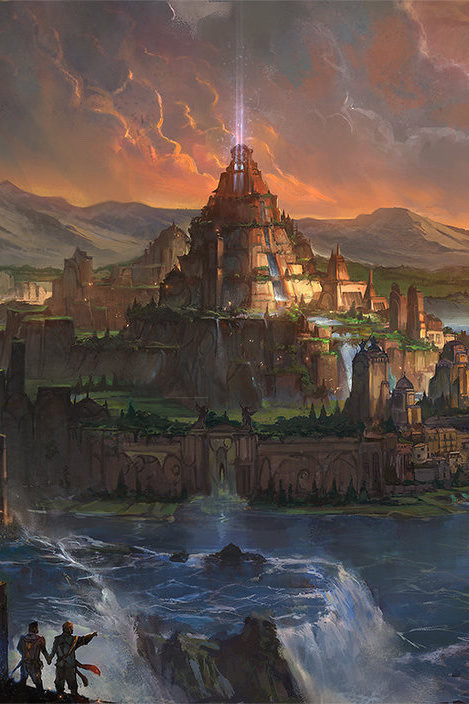
#archaeology#adventure#travel#adventure gear#travel gear#planetary defense#visions of atlantis#Plato#timaeus#Critias#Atlantis#flood myth#deluge myth#lost civilization#science of Atlantis
9 notes
·
View notes
Text
Gun-Me?! No, Gun-Yu!
A poorly-considered slapstick retelling of the Great Flood myth of China in the third or second millennium BCE.
#bad idea#movie pitch#pitch and moan#flood myth#flood#gun-yu#emperor yao#china#chinese mythology#chinese history#slapstick#slapstick comedy#comedy
0 notes
Text
雅典系列之二:大洪水
回「希腊罗马神话」
在 上一回 里,我们提到了雅典的来历,和它第一任国王凯克洛普斯(Cecrops I)。继任的第二届国王名字叫克雷纳奥斯(Cranaus),后面再继任的第三届国王叫安菲克特翁(Amphictyon)。
说起雅典的第三任国王,就不能不提到他的父母,和古希腊大洪水的神话。
Le déluge, c.1911, by Léon Comerre (1850–1916)
关于大洪水,我们一般比较熟悉的有两段故事:旧约圣经里的「诺亚方舟(Noah’s Ark)」,和两河流域的「吉尔伽美什洪水(Gilgamesh Flood…

View On WordPress
0 notes
Text
Who Got It Right?
Who Got It Right?
For verily I say unto you, Till heaven and earth pass, one jot or one tittle shall in no wise pass from the law, till all be fulfilled.. (Matthew 5:18)
Someone wrote to me with the following question: “Just wondering if you have done any research into the first civilization, according to science, known to man the Sumaritans [sic]. Their writings contain the original creation story that Moses and…
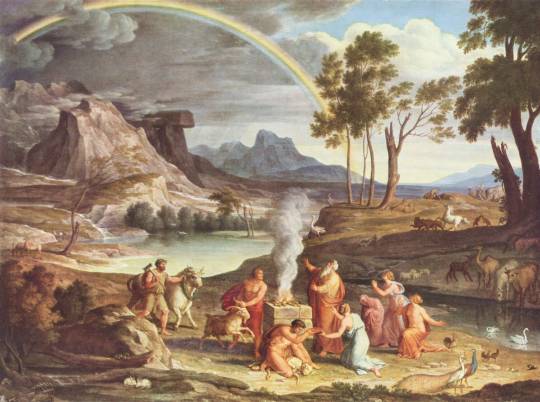
View On WordPress
0 notes
Text
💔💔💔
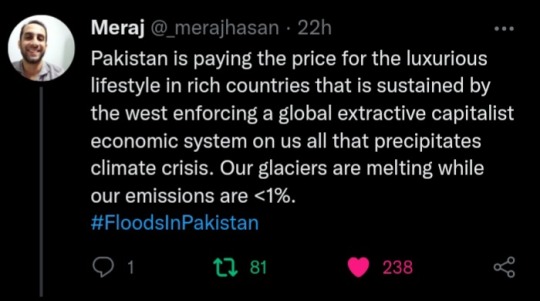

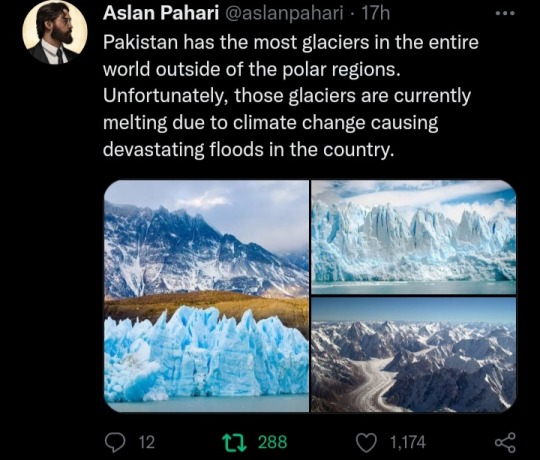
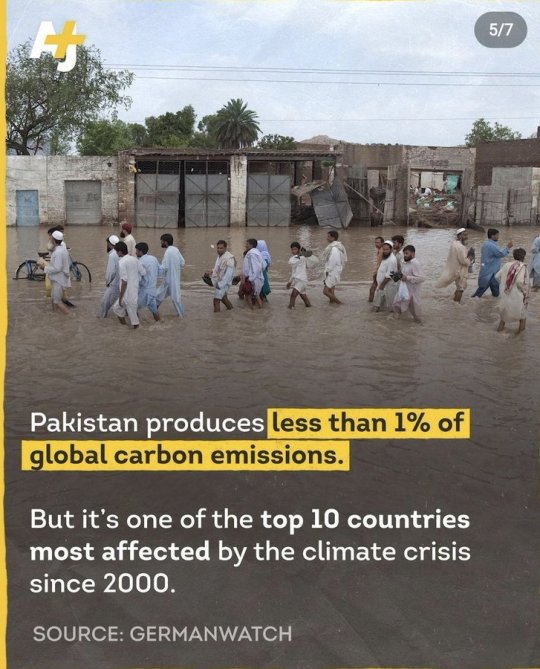
#Pakistan#floods#pray for Pakistan#climate change#where are those western politicians who say climate change is a myth?#where are the private jet owners?
7K notes
·
View notes
Text
more about blood of eden naming because i have sunk my teeth into it, especially on how they use the names of destroyed and mythical places.
the wings/cells
merv: also alexandria, antiókheia in margiana, marw al-shāhijān. located in iran. inhabited from c. 2000BCE, a holy site to zoroastrians, one-time capital of the islamic caliphate, razed to the ground in 1788/9.
ctesiphon: also tyspwn, ktesiphōn. located in iran iraq (sorry, my geography of this area begins with sumerian cities and ends with aššur). founded c.120BCE, capital of the parthian, sasanian empires. besieged in the battle of al-qādisiyyah in 637CE, became a ghost town afterward.
troia: troy, illios, wiluša. the one heinrich schliemann “““excavated”““. located in turkey. inhabited from c. 3600BCE, the troy, the one we all know, hektor, akhilleus, kassandra. the milawata letter. destroyed multiple times over the millennia, the last being in thee roman era.
lemuria: mythical lost continent beneath the indian ocean, proposed by philip sclater, later appropriated by occultists. identified with the lost continent of kumari kandam by some tamils, which is believed to be their ‘cradle of civilization’ where the population was solely tamils.
mu: also a mythical lost continent, name also used interchangeably for lemuria and atlantis, the product of the mind of augustis le plongeon.
further, we see we suffer use the following names for other military cells in chapter 27:
saaftinge, zoar, birmingham, maputo, taree, memphis, taksa, calakmul, valencia, opava, dundee
normal cities, to us. however, to the people of blood of eden, these are all mythical, lost places regardless of the reality of merv, tyspwn, and wiluša. they are at a remove of ten thousand years. they are in the space between the fall of roman troy and the re-discovery of it, though there can be no rediscovery, only stories. much like australian aboriginal stories stretch back before certain parts of australia were underwater, blood of eden preserves the names of places that have been obliterated by the nuclear bombs, by whatever john continued to do to earth to have it so completely covered by water except for canaan house.
‘the flood, you know? You can wash things clean. that’s all the end of earth was … making things clean’, says john, and that’s what he did. he re-enacted the story of atra-hasis, of utnapištim, but there was no one to speak through the reed wall to save humanity even though, through the ages, it is very likely that the story of john destroying the earth became their new flood myth, their ‘god decided the world was too populous and was going to destroy it, and we are the chosen people who managed to survive.’ the whole of earth is mu, is lemuria.
#nona the ninth spoilers#ntn spoilers#blood of eden#LOOK I HAVE A LOT OF THOUGHTS ABOUT WHAT BOE'S MYTHOLOGY MUST BE LIKE#also about how the greek flood myth might tie in because one of the survivors is named PYRRHA
419 notes
·
View notes
Text
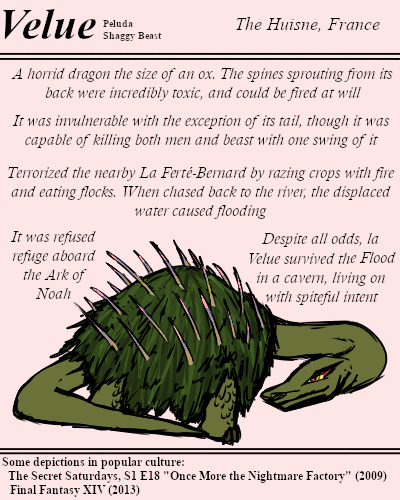
La Velue was a terrible dragon who dwelled within a cavern by the Huisne. While it was ultimately slain, its various abilities made it quite a fearsome thing.
On spite it lived on beyond the flood, and with spite it acted until the very end.
#BriefBestiary#bestiary#digital art#fantasy#folklore#legend#myth#mythology#monster#dragon#french dragon#french folklore#la velue#peluda#velue#shaggy beast#la ferté-bernard#river huisne#flood myth
29 notes
·
View notes
Text
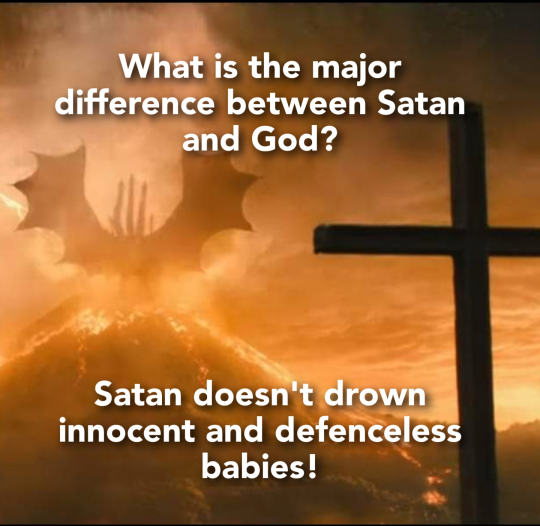
"What is the major difference between Satan and God?
Satan doesn't drown innocent and defenceless babies!"
Genesis 7:21-23
And all flesh died that moved upon the earth, both of fowl, and of cattle, and of beast, and of every creeping thing that creepeth upon the earth, and every man:
All in whose nostrils was the breath of life, of all that was in the dry land, died.
And every living substance was destroyed which was upon the face of the ground, both man, and cattle, and the creeping things, and the fowl of the heaven; and they were destroyed from the earth: and Noah only remained alive, and they that were with him in the ark.
You worship an imaginary mass murderer.
#christianity#bible#bible study#genocidal god#god of genocide#mass murder#god is a murderer#genocide#religion#flood myth#noahic flood#genesis flood#religion is a mental illness
35 notes
·
View notes
Text
Sunken Lands: A Journey Through Flooded Kingdoms and Lost Worlds by Gareth E. Rees: Book Review
Sunken Lands, the new book by Gareth E. Rees may be one of those that forms a quandary for bookshop staff – just what shelf should it be placed on? For within its pages it covers a wealth of terrain (mostly of the moist or entirely saturated variety). Is it a folklore and legend book? A travel and history book? Psychogeographical philosophy? Natural History/Conservation? Occulture and Mystery?…

View On WordPress
15 notes
·
View notes
Text
Genuinely considering going back to religion but like. In a different way. I really enjoy theology and reading about the original books of the Bible and how it all came into one and I want a sense of purpose in my life. Is this a normal feeling or am I autism special interesting religion bc that feels offensive
#me going up to a regular chistian and asking them their opinions on the first book of Enoch and having them blank stare at me unless they to#too are also into theology#also the ties between the flood myths and other cultures creation myths#the land diver or whatever in comparison to the dove in the Noah story#meltwater pulse 1b too#and how an being cultures understood the natural phenomena around them
8 notes
·
View notes